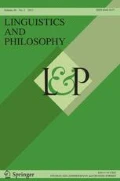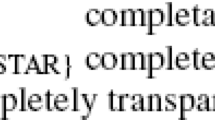Abstract
This paper explores a novel analysis of adjectives in the comparative and the positive based on the notion of a trope, rather than the notion of a degree. Tropes are particularized properties, concrete manifestations of properties in individuals. The point of departure is that a sentence like ‘John is happier than Mary’ is intuitively equivalent to ‘John’s happiness exceeds Mary’s happiness’, a sentence that expresses a simple comparison between two tropes, John’s happiness and Mary’s happiness. The analysis received particular support from various parallels between adjectival constructions and corresponding adjective nominalizations which make reference to tropes.
Similar content being viewed by others
References
Alrenga (to appear). Comparisons of similarity and difference. Proceedings of the workshop on the formal analysis of adjectives, Paris 7, Jussieu 2005.
Bacon J. (1995) Universals and property instances – The alphabet of being. Blackwell, Oxford
Beebee H., Dodd J. (2006) Truthmakers. Oxford University Press, Oxford
Benacerraf P. (1965) What numbers could not be. The Philosophical Review 74: 47–73
Bierwisch M. (1987) Semantik der Graduierung. In: Bierwisch M., Lang E. (eds) Grammatische und Konzeptuelle Aspekte von Dimensionsadjektiven. Akademie Verlag, Berlin, pp 91–286
Campbell K. (1990) Abstract Particulars. Blackwell, Oxford
Cresswell M. (1976) The semantics of degrees. In: Partee B. (eds) Montague grammar. Academic Press, New York, pp 261–292
Engel R.E. (1989) On degrees. The Journal of Philosophy 86: 23–37
Fine, K. (1982). Acts, Events, and Things. In W. Leinfellner et al. (Eds.), Sprache und Ontologie. Proceedings of the eighth Wittgenstein symposium, Hoelder-Pichler-Tempsky, Vienna, pp. 97–105.
Fine K. (1998) Cantorian abstraction: A reconstruction and defence. The Journal of Philosophy 55(12): 599–634
Goldman A. (1971) A theory of human action. Prentice Hall, New York
Heim, I. (2006). Remarks on comparative clauses as generalized quantifiers. Ms, MIT.
Kamp H. (1975) Two theories of adjectives. In: Keenan E. (eds) Formal semantics of natural language. Cambridge University Press, Cambridge, pp 123–155
Kennedy C. (1999) Projecting the adjective: The syntax and semantics of gradability and comparison. Garland, New York
Kennedy C. (2001) Polar opposition and the ontology of degrees. Linguistics and Philosophy 23: 33–70
Kennedy C. (2007) Vagueness and grammar. The semantics of relative and absolute gradable adjectives. Linguistics and Philosophy 30: 1–45
Klein E. (1980) A Semantics for positive and comparative adjectives. Linguistics and Philosophy 4: 1–45
Klein E. (1991) Comparatives. In: Stechow A., Wunderlich D. (eds) Semantik: Ein Internationales Handbuch der Zeitgenoessischen Forschung. Walter de Gruyter, Berlin, pp 647–691
Levinson J. (1980) The particularization of attributes. Australasian Journal of Philosophy 58: 102–115
Lowe J. (2006) The four-category ontology. A metaphysical foundation for natural science. Oxford University Press, Oxford
Maurin A.-S. (2002) If Tropes. Kluwer, Dordrecht
Mertz D.W. (1996) Moderate realism and its logic. Yale University Press, New Haven
Moltmann F. (1997) Parts and wholes in semantics. Oxford Universtiy Press, Oxford
Moltmann F. (2004) Properties and kinds of tropes: New linguistic facts and old philosophical insights. Mind 113: 1–43
Moltmann F. (2007) Events, tropes, and truthmaking. Philosophical Studies 134: 343–403
Morzycki M. et al (2008) Adverbial modification of adjectives: Evaluatives and a little beyond. In: Doelling J. (eds) Event structure in linguistic form and interpretation. de Gruyter, Berlin
Mulligan K., Simons P., Smith B. (1984) Truthmakers. Philosophy and Phenomenological Research 44: 287–321
Pinkal, M. (1989). On the logical structure of comparatives. In R. Studer (Ed.), Lecture notes in artificial intelligence, Berlin, pp. 146–167.
Reprinted in Mellor & Oliver (Eds.), pp. 112–124.
Rizzi L. (1999) Relativized minimality. MIT Press, Cambridge (Mass.)
Rothstein S., Winter Y. (2004) Total adjectives vs. partial adjectives: Scale structure and higher-order modifiers. Natural Language Semantics 12: 259–288
Schiffer S. (1987) Remnants of meaning. MIT Press, Cambridge (Mass.)
Schnieder B. (2004) A note on particularized properties and bearer-uniqueness. Ratio 17: 218–228
Schwarzschild R., Wilkinson K. (2002) Quantifiers in comparatives. A semantics of degree based on intervals. Natural Language Semantics 12: 1–41
Schwarzschild R. (2005) Measure phrases as modifiers of adjectives. Recherches linguistiques de vincennes 35: 207–228
Simons, P. (1994). Particulars in particular clothing. Three trope theories of substance. Philosophy and Phenomenological Research, 54(3), 553–574. Reprinted in S. Laurence & C. MacDonald (Eds.), Contemporary readings in the foundations of metaphysics. Oxford: Blackwell, 1998.
Strawson P. (1959) Individuals. Methuen, London
Stout G.F. (1952) God and nature. Cambridge University Press, Cambridge
von Stechow A. (1984) Comparing semantic theories of comparison. Journal of Semantics 3: 1–77
Williams D.C. (1953) On the elements of being. The Review of Metaphysics 7: 3–18
Woltersdorff N. (1970) On universals. Chicago University Press, Chicago
Wright C. (1983) Frege’s conception of numbers as objects. Aberdeen University Press, Aberdeen
Yoon Y. (1996) Total and partial predicates and the weak-strong interpretations. Natural Language Semantics 4: 217–236
Author information
Authors and Affiliations
Corresponding author
Rights and permissions
About this article
Cite this article
Moltmann, F. Degree structure as trope structure: a trope-based analysis of positive and comparative adjectives. Linguist and Philos 32, 51–94 (2009). https://doi.org/10.1007/s10988-009-9054-5
Received:
Accepted:
Published:
Issue Date:
DOI: https://doi.org/10.1007/s10988-009-9054-5




